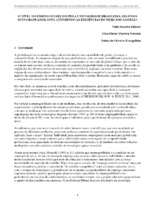| dc.contributor.author | Infante, Vidal Sunción | |
| dc.contributor.author | Teixeira, Elisa Elaine Moreira | |
| dc.contributor.author | Evangelista, Dalmo de Oliveira | |
| dc.date.accessioned | 2018-09-02T05:08:09Z | |
| dc.date.available | 2018-09-02T05:08:09Z | |
| dc.date.issued | 1997 | |
| dc.identifier.uri | http://cladista.clad.org//handle/123456789/533 | |
| dc.description.abstract | This work is intended to find an answer to the following question: How well trained are our graduates to face the present unemployment challenge? With the purpose to get a better insight into the problem under study, a survey of graduates who are presently attending special courses, which are intended to prepare professionals applying for a public job through public selection tests, was carried out. In terms of salary it was found out that most of them are unhappy in their present job (48.9%)This fact stimulates a demand for better job opportunities, and that is why they are attending such courses. Among those interviewed 70,5% have already sat for some sort of selection test without success; 66,2% pointed to the fact that the market demand is for highly qualified and skilled professionals. Therefore, 56,7% stressed that the University should emphasize "Theory and Practice" in their courses, according to the conditions imposed by a global market. On the other hand 92,6% said that the University is failing in preparing professionals who will be able to meet the needs of a global economy. Thus, the effects of a global economy on employment is clear to the graduates who live in the metropolitan area of Natal/RN-Brazil and took part in this research during the period of January/97 to February/97. | |
| dc.description.abstract | The results showed that the level of knowledge of the surveyed subjects is below that of the market needs. It was ascertain that 16,9% of the graduates surveyed are engineers, although 28 different professions have been identified within the group. The second greater percentage goes to accounting with a total of 16,5 %, followed by management. | |
| dc.description.abstract | To sum up, these results constitute an alert to the Brazilian University in order to redirect its teaching activities towards a better skilled and qualified professional to meet the present market demand (CNPq). | |
| dc.format.extent | 9 p. | |
| dc.language | Portugués | |
| dc.publisher | Universidade Federal do Rio Grande do Norte | |
| dc.rights | Creative Commons BY-SA-NC 4.0 Int | |
| dc.rights.uri | http://creativecommons.org/licenses/by-nc-nd/4.0/ | |
| dc.subject | CONGRESO CLAD 2-1997 | |
| dc.subject | REFORMA DEL ESTADO | |
| dc.subject | UNIVERSIDADES | |
| dc.subject | EMPLEO | |
| dc.subject | PROGRAMAS DE ENSEÑANZA | |
| dc.subject | EVALUACION DE PROGRAMAS | |
| dc.subject | MERCADO DE TRABAJO | |
| dc.subject | PERFIL OCUPACIONAL | |
| dc.title | O nível do ensino oferecido pela universidade brasileira, segundo seus graduados, está atendendo ás exigencias do mercado global? | |
| dc.type | article | |
| clad.congress | Congreso Interamericano del CLAD sobre la Reforma del Estado y de la Administración Pública, 2 | |
| clad.key | MFN26375--26375 | |
| clad.key1 | KEY26375 | |
| clad.region | BRASIL | |
| clad.md5 | 19e89d01afe6c73772f6c8985445df89 | |


